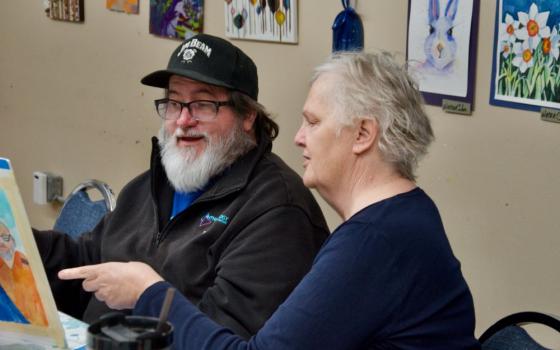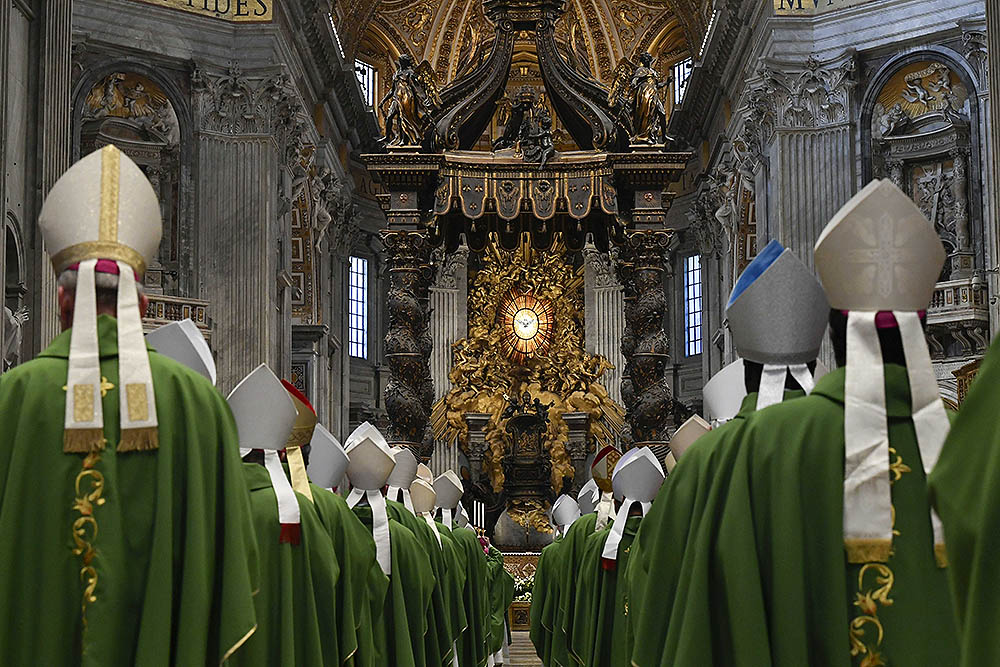
Bishops process into St. Peter's Basilica at the Vatican Oct. 29, 2023, for a Mass marking the conclusion of the first session of the Synod of Bishops on synodality. (CNS/Vatican Media)

Many women present at the synod on synodality this past October "expressed deep gratitude for the work of priests and bishops," but also noted that clericalism continues to "scar the face of the Church and damage its communion." The assembly stated in the synthesis report that a "profound spiritual conversion is needed" to meet the "desire to promote a Church in which men and women dialogue together… without subordination, exclusion, and competition."
This month, we asked our panelists: What is the spiritual conversion needed in order for healing to take place? What would you hope to see?
______
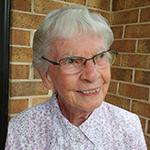
Kathleen Feeley, a School Sister of Notre Dame, served as president of the College of Notre Dame of Maryland (now Notre Dame of Maryland University) 1971-92. She has taught college, high school and elementary students. After her college presidency, she taught literature in India, Australia, China, Japan and Ghana. Feeley has a master's degree in English from Villanova University and a doctorate from Rutgers University. She now teaches at Notre Dame of Maryland's Renaissance Institute, which serves lifelong learners over age 50.
Lent is kairos time for God's people to experience a profound spiritual conversion. We need to recognize that all God's people, men and women, give glory to God by using the fullness of their potential to love, honor and serve God through the way they live their lives.
But Catholic women have been bound by invisible tape since the beginning of the organization of the Catholic Church. The tape muffles the voice and binds the spirit.
Women were not bound at the time of Jesus. They gave fearless service to Jesus and animated his ministry. Check your Bible. Study the references to women.
Who had deep relationships with Jesus? Who were gathered at the site of the Crucifixion? Who noted Jesus' burial place, prepared ointments, and came to the tomb on Easter morning? To whom did Jesus reveal himself in glory? Who received the message: "Go tell my brothers ..."?

Detail from a 12th-century illumination depicting the three Marys at the empty tomb (Wikimedia Commons/Koninklijke Bibliotheek)
The binding began when the hierarchy of the church was formed: all men. Rationale? None except deep-seated conviction, completely unwarranted, that men were superior — on all levels — to women.
Thus was bred clericalism. Thus has it continued. No one easily gives up power.
At the resurrection of Lazarus, Jesus said, "Unbind him and let him go." The call of the Gospel today says to clerics, "Unbind women. Search your heart. Uncover your clerical beliefs and actions. Pray for the grace of understanding. Pray for a change of heart. Know that God wants this more than you do. Cut the tape that binds you as well as all the women with whom you interact."
With God's grace, on Easter morning you will have experienced a profound spiritual conversion. And the Catholic Church will flourish!
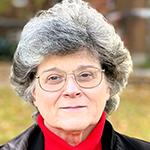
Lucy Zientek is a Sister of Divine Providence, Melbourne, Kentucky, and currently serves on the leadership team of her congregation's U.S. province. She has 14 years' experience as a research and development scientist prior to entering religious life. She has served on parish pastoral teams in the areas of adult faith formation, Christian initiation and pastoral ministry. She also presents retreats and days of reflection. Supported by an educational background and career and ministry experience in science, theology and spirituality, her special area of interest is the relationship between science and faith.
St. Paul's perception of reality was upended on the road to Damascus, but the conversion he experienced there took the rest of his life to play out. Conversions have beginnings, but are really journeys that take time, prayer, discernment and trust that God will provide what's needed to bring those journeys to fulfillment.
But what can be said about the kind of conversion needed to heal the damage that clericalism does to the church's communion?
There's no simple answer, but several years ago, the Holy Spirit may have provided us with some wonderful guidance about this.
It emerged from the lived experience of sisters serving on the leadership team of the Leadership Conference of Women Religious (LCWR) between 2009 and 2015. It was during this period that LCWR was apprised of and responded to the decision by the Congregation for the Doctrine of the Faith to conduct an assessment of the conference's programs and activities.
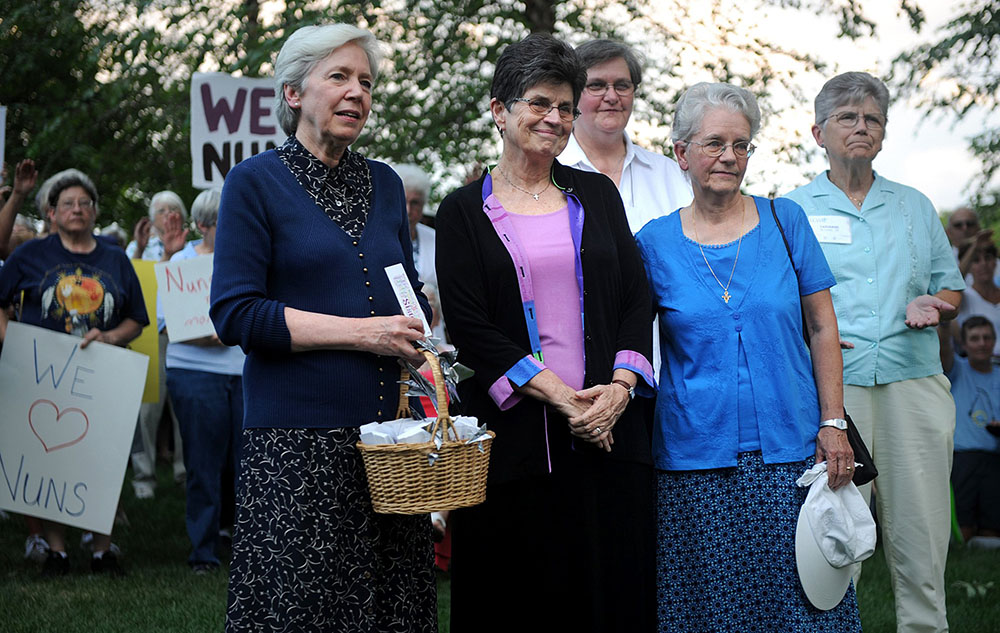
On Aug. 9, 2012, Dominican Sr. Mary Hughes, at the time past president of the Leadership Conference of Women Religious, left, joins Franciscan Sr. Pat Farrell, then LCWR president, and Franciscan Sr. Florence Deacon, then president-elect, as supporters offer a blessing at a rally during LCWR's 2012 assembly in St. Louis. (CNS/Sid Hastings)
They were difficult years, and the journey was anything but easy. Yet, marked by the deep individual and corporate prayer, reflection and discernment of LCWR leadership, and supported by that of sisters throughout the United States, it was also a remarkably beautiful and sacred time that yielded a treasure trove of spiritual wisdom.
Afterward, the group came to understand their learnings might prove helpful for others working with similar difficulties in an increasingly polarized world. The sisters who were most involved with the conference's responses then captured the insights that emerged from the struggles and blessings of that journey by writing personal reflections that were shared with the world in the book However Long the Night: Making Meaning in a Time of Crisis, edited by Immaculate Heart of Mary Sr. Annmarie Sanders.
What kind of conversion is needed so dialogue can happen "without subordination, exclusion, and competition"?
In However Long the Night, Dominican Sr. Mary Hughes points to humility as a powerful spiritual tool. It calls us not to subservience, but to embrace and stand in the truth about ourselves: our strengths, gifts, failures and limits. It highlights our need to "be vigilant about conscious and unconsciously held assumptions" we have about others, that over time can lead to misunderstandings that undermine communion when they are incorrect.
Nothing is more important today than humanity's transformation from species to a communion. Species direct energy primarily toward themselves; a communion of persons finds its own fullness in the fullness of the other.
Any hope we have to effectively address climate change rests on our acting in a globalized, unified way. We're not there yet. Why? Because our hearts must freely embrace their conversion, while our bodies transform the way we direct energy across the planet. Both are needed, but becoming communion is now the key.
I hope and pray that our church takes the extraordinary opportunity presented by the synod to model for the world how to repair and build communion with each other.

Mary Karuna Matthew is a native of India and is affiliated with the Congregation of the Sisters of Notre Dame of Coesfeld, Germany. Her areas of specialization include education, theology, formation and psychology. With a wealth of experience in education and formation, she currently serves as part of the general administration, where she oversees the congregation's formation program. She lives in Rome.
What do we understand by "spiritual conversion"? The Greek word metanoia means "change of mind," meaning a change in one's life resulting from a spiritual conversion and allowing one to go deeply to turn away from the old ways. It should bring a fundamental and enduring change of mind, heart, attitudes and perception that produces a new way of seeing and relating to God and others.
If we envision a synodal church that focuses on communion, mission and participation, spiritual conversion is crucial. To bring healing to the wounded church, we need to be inclusive, listening with heart, and dialoguing with respect. A movement from an egocentric and narcissistic attitude to a compassionate and empathetic attitude is vital.
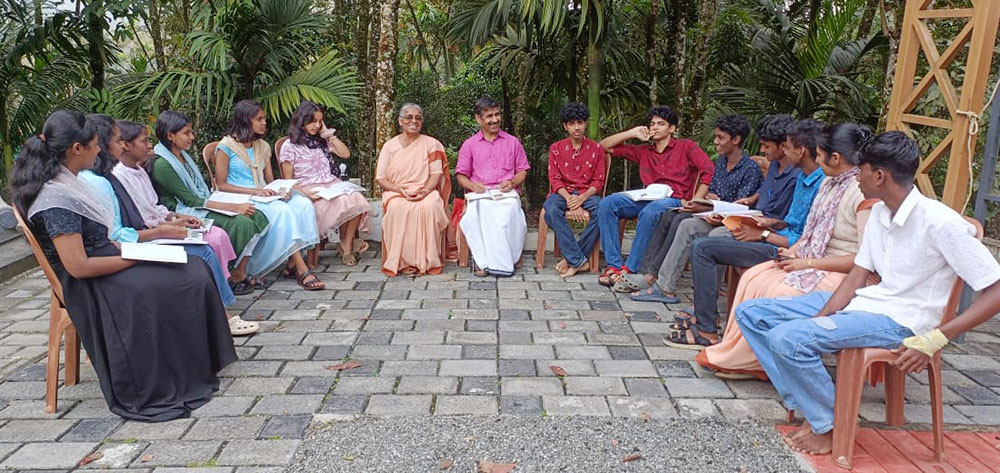
Sisters of Notre Dame from Thrikkaipetta, Kerala, India, engaged in dialogue with the parishioners of St. George Church in the spirit of synodality. (Mary Karuna Matthew)
Spiritual conversion will challenge us to walk unexplored paths and new roads, to meet the people where they are, especially those who are vulnerable and on the periphery.
Are we open? If so, spiritual conversion will change the fabric of the church.
I hope to see a synodal church that brings changes in hierarchical and patriarchal structures. Dominance and control over others bring about destructive consequences in God's creation. Gender inequality is one such destructive force that the church must confront to transform and to heal women from the plague of gender subordination.
At the time of Jesus, women were seen as inferior by cultural groups, but he saw them as equals in the eyes of God. Jesus' images, parables and teachings were examples of how women were treated equally and loved by him.
At the time of Jesus, women were seen as inferior by cultural groups, but he saw them as equals in the eyes of God.
Hence, women deserve to be treated equally, giving them a greater role in the decision-making process, and in positions of responsibility and governance. To enhance and promote communion among the people of God, we need to dismantle church structures and policies that oppress and diminish individuals.
The continuity in contemplative dialogue and deep listening between the church's hierarchy, clergy, religious and laypeople will contribute to the incredible journey of walking together. Let God lead us where we dare not go. Let God be with us as we face new days — for our strength is in our communion.

Nancy Mancera is a Colombian missionary with the Verbum Dei Missionary Fraternity. She studied theology in Guadalajara, Mexico, and earned a degree in dogmatic theology from the Gregorian University in Rome. She has been involved in apostolic work in countries that include Mexico, Colombia, Belgium, Italy and Guatemala, serving diverse populations from children to adults. She has also established radio programs at the diocesan level to support apostolic group formation and conducted retreats for teenagers and university students. She currently lives in Guatemala.
When I met the community I belong to, one of the first things that caught my attention was finding a place where men and women had different roles but respected each other, treating each other like brothers and sisters.
The first Eucharist I experienced in this community took place in a small chapel in Bogotá, Colombia. We were a very small group of people; some of us were university students beginning to get close to God through this mediation. The celebration was led by a newly ordained priest who invited us to share the echo of the word of God during the homily.
Advertisement
It was a beautiful experience that showed me a face of the Church I was unfamiliar with, echoing the words of the prophet Joel: "I will pour out my Spirit on all people. Your sons and daughters will prophesy" (Joel 3:1).
This marked a milestone in my life, to the point that I started to feel that I would love to belong to a community where, as St. Paul says, "there is neither Jew nor Gentile, neither slave nor free, nor is there male and female" (Galatians 3:28), but rather the identity of each is to be a child of God, a baptized one, placing us in equal dignity. Thus, having the same rights and duties, we can walk together as bearers of the word of God and spokespersons of his kingdom of love.
Unfortunately, things get complicated, times change, and over the years, viruses infiltrate our structures. What began as a beautiful space of fraternity, equality in difference, gradually became filled with difficulties typical of the century we live in.
Competitiveness betrays us, puts us in conflict, and an unconscious struggle arises in our hearts. This leads us to desire to occupy the place we perceive has been taken from us for years.
Therefore, this Lent, I long for a mental conversion, one where I willingly challenge my established thought patterns. It's not merely about changing the gender of the one who is "at the top of the pyramid." It's a call to dismantle every engrained mental pyramid and embrace the mindset and lifestyle of Jesus.
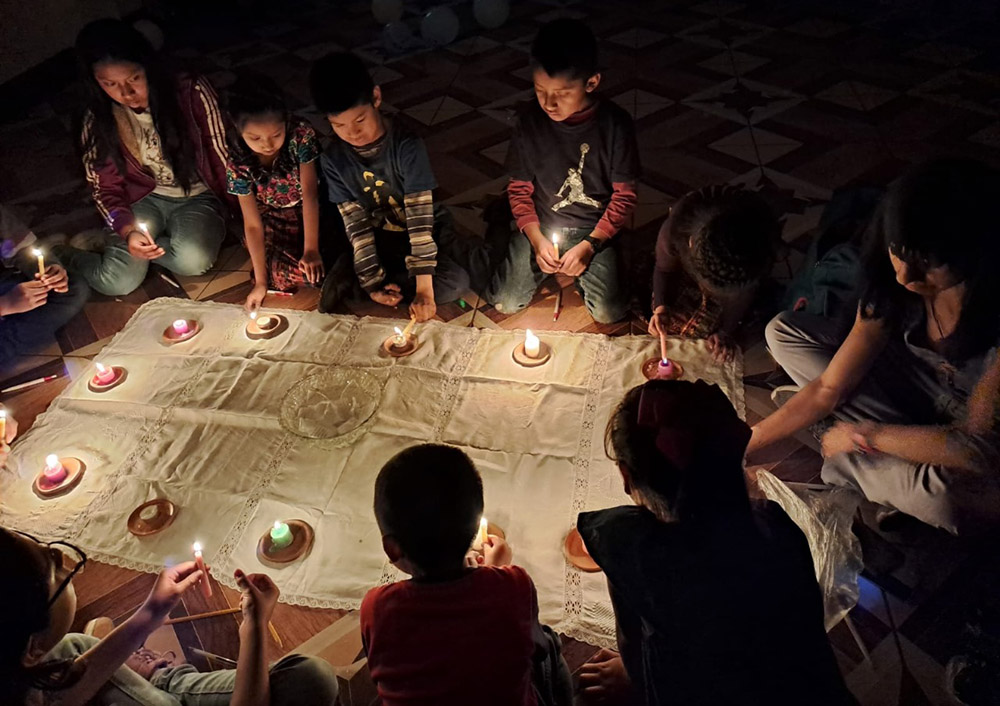
A circular church in which every child of God has his or her place reserved by Christ: anticipating Easter celebrations with children and adolescents in Chimaltenango, Guatemala, March 2023 (Courtesy of Nancy Mancera)
He came to serve all, to generate the circularity abundant in the Trinity, where unity in diversity is fully lived, and each person is accorded equal dignity and respect.
I would love to see more priests with the spirit of my founder, Fr. Jaime Bonet, who did not champion either gender but simply lived to promote the baptismal dignity of the entire people of God. With that simple, yet profound intuition, he sought to ensure that each person would find their unique place in the church, recognizing themselves as integral contributors with roles that no one can take away.
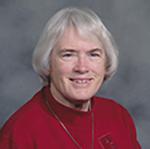
Patricia Wittberg is a Sister of Charity of Cincinnati. She holds a doctorate in sociology from the University of Chicago, and she taught the sociology of religion and religious organizations for 30 years at Fordham University and Indiana University (Indianapolis). She currently administers her congregation's Seton Enablement Fund, which gives low-interest loans to nonprofit organizations that help poor and marginalized people. She is also a research associate for the Center for Applied Research in the Apostolate, or CARA, at Georgetown University.
When I was a child, my handyman father decided to rip out our crumbling blacktop driveway and lay a new concrete one. He carefully smoothed the surface he laid, trying to make it perfectly level.
He did a good job; that driveway is still there more than six decades later. But after the first storm, we could see it was not perfectly level. Small, shallow puddles appeared in the same places after every rainfall.

(Dreamstime/Zigzagmtart)
I remembered that driveway when I was in graduate school and read a study of power in churches. The author was describing a Baptist denomination that taught that all believers were equal. There were no bishops or priests, only ministers employed by each congregation. They had, the author noted, "no theology of Church power."
But power in this denomination didn't vanish just because the members denied its legitimacy. Like the puddles in my father's driveway, it collected in unexpected places, and was harder to deal with because the church officially denied its existence. Some of the most destructive cult leaders — Jim Jones, David Koresh — rose to power in denominations with no recognized authority to stop them.
The Catholic Church does have such leaders. But their presence causes a different temptation. Clericalism arises when they — and we — confuse their legitimate authority with superiority. "Superior" leaders claim all power for themselves, usurping the authority that properly belongs to others.
The author I read in graduate school also noted that the Catholic Church had "no theology of Church error" by its leaders, which can be equally dangerous.
Adopting Jesus' vision means holding both values, authority and equality, together.
Jesus had a lot to say about the clericalism of his day. He taught his followers that their leaders should be "the last of all and the servants of all."
This doesn't mean denying the legitimate authority of priests and bishops, but it does mean denying their superior power. This is hard — for Catholics and Baptists and every denomination in between — because Americans assume that the two are the same. Those who dislike superior power often want to eliminate authority, too. Those who value authority think this means that the holders of authority should be superior. This is a root, I think, of divisions in our church today.
Adopting Jesus' vision means holding both values, authority and equality, together. We need a conversion that leads us to reverence all members of the people of God, with the unique authority — and blind spots — of each.
This never-ending conversion will always be incomplete. The hunger for power will continue to tempt us, and power will therefore tend to concentrate unevenly within the people of God.
I believe God calls instead to the kenosis of Jesus — who refused to cling to divine power "but emptied himself" to become one of us. Imitating his emptying is the source of the power God wants to give each of us.



